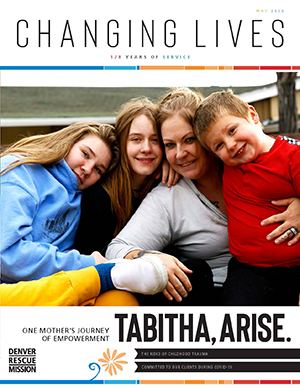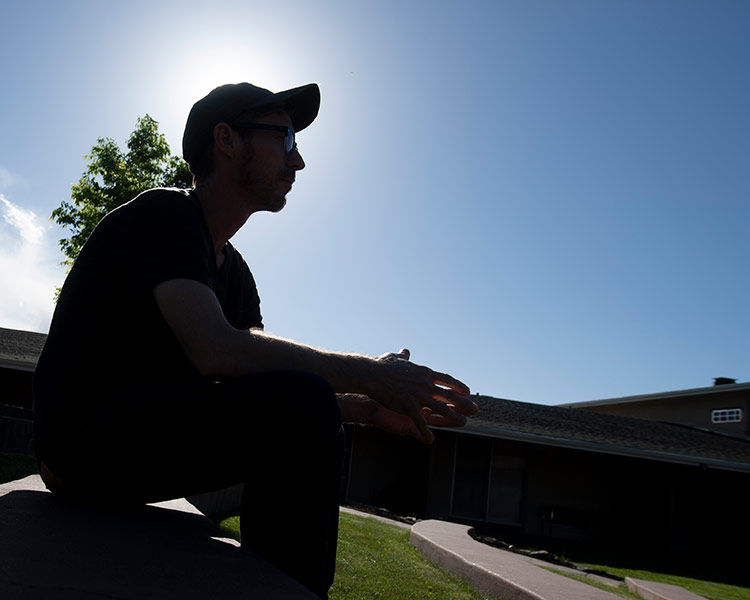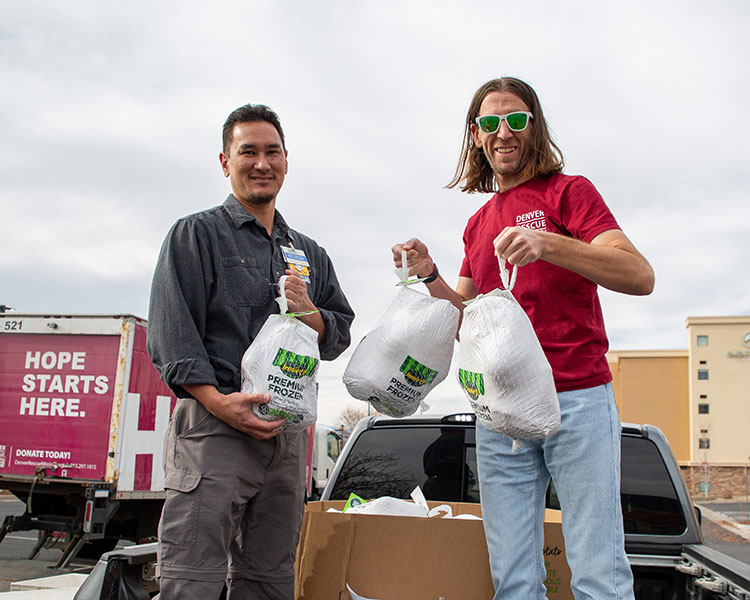In the midst of pain, fear and defeat, God has called her to arise.
YOUNG TABITHA
Tabitha, a mother of three and Aurora native, grew up feeling unwanted by her mother and misused by her father—tainted by a childhood filled with adversity. “The only things I remember is trauma,” she said. “There was nothing positive.” As a young girl, she yearned for her mother, who struggled with an all-consuming addiction to alcohol. “I remember being five or six and crying for my mom,” Tabitha said. “I remember always wondering where my mom was.”
When her mother moved to another state, Tabitha went to live with her father and experienced sexual abuse from him and his friends. She remembers living in a house that was constantly trashed and her father using drugs and being violent toward her. The agonizing trauma she experienced led to suicidal thoughts, causing her parents to send her to state hospitals and behavioral healthcare facilities. She was diagnosed with bipolar disorder and attention deficit
disorder. “I always wanted to just end my life,” she said.
Her only positive memory is the day her neighbor led her to Jesus when she was 12. “We were just two kids sitting on the street praying,” she said. “And I just always believed in Him.”
As she entered her teenage years, she turned to drugs and alcohol to cope with the pain of her past—habits that spiraled into an opioid addiction that lasted 16 years.
At 21, Tabitha had her first daughter, Julie. She had two more children in the years to follow, Kayla and Kaden. Because her unstable lifestyle left her incapable of taking care of them, she lost custody during various seasons of their lives. She spent about a year living on the streets in a constant state of anxiety and depression.
“I was drinking, I was taking pills and I had given up on life,” she said.
A PIVOTAL BREAKTHROUGH
On Mother’s Day of 2017, Tabitha experienced a spiritual encounter with God in her trailer in Aurora as He spoke to her vividly in a state of desperation. “He already knows your entire life, all the drugs you’ve done,” Tabitha said. “You don’t have to get clean and go to God. You go to God as you are.”
She started pursuing sobriety for the first time out of a deep desire to acquire permanent custody of her children, but she did not have stable housing and had a deadline of December 15, 2019 to secure a long-term housing plan. Tabitha’s prayers were answered on December 11, 2019 when she joined Denver Rescue Mission’s STAR Transitional Program and moved to The Crossing with Julie, 16, Kayla, 13, and Kaden, seven. ”I don’t know where we would have gone,” she said. “I feel like this place solidifies that God is real.”
Jaquella Brennan, Tabitha’s case manager, has taught her to use healthy coping mechanisms in order to maintain sobriety and address the trauma she’s experienced. She is also in counseling, which is a requirement of the program.
“She’s really excited about her sobriety and works really hard to maintain it,” Jaquella said. “The goal is for her to have the coping skills to work through [situations] independently.”
Trauma-Informed Care
Trauma-informed care involves understanding the effects of trauma and helping survivors rebuild control and empowerment.
A NEW SEASON OF MOTHERHOOD
For the first time in her life, Tabitha has a solid support system to help her navigate the complexities of parenthood and distinguish the individual needs of her children. She’s learning how to be a mother when she never had her own around to learn from—to be strong for her kids when there was never anyone to be strong for her. “The only thing I’ve prayed for is to be a mom,” she said, “and the only way that I know how to be a mom is through God.”
Julie, Kayla and Kaden have started attending the after-school youth program at The Crossing on a weekly basis, which has created opportunities for Mission staff to step in and help. “I have so much support here,” Tabitha said. “The kids program has been phenomenal. My kids cannot be in a better place. They need stability.”
She’s being proactive about her children’s mental health. “Tabitha is really amazing at being present with them,” Jaquella said. “Everyone’s in therapy, because she understands they’ve been exposed to a lot.”
Tabitha is working on restoring her relationship with her parents. “God’s working on the bigger pieces of me: humility, kindness and forgiveness,” she said. “He gave me a responsibility when He saved me in that trailer to break the cycles, not just in my life, but in the lives of my mom, my family and these three kids.”
There is a special, biblical significance to the name Tabitha.
Acts chapter nine shares about a woman named Tabitha from Joppa, a disciple of Jesus with motherly, nurturing qualities, who passed away from an illness. The disciples called for Peter to come see her. He knelt down, prayed, and said, “Tabitha, Arise,” and she was restored to life. The miracle became known all over Joppa, and many believed in the Lord.
In a trailer in Aurora—in her most broken state—God called Tabitha into a new life. He has called her to pursue motherhood. He has called her to share her testimony to empower others. He has called her to arise.
Tabitha is overcoming a life of trauma so she can better support her children. Your donations are allowing the Mission to help Tabitha and other families heal.
The Risks of Childhood Trauma
Childhood trauma is one of the biggest indicators of future barriers and deficits. Children who are exposed to five or more Adverse Childhood Experiences (ACE), such as abuse, neglect or family dysfunction, in their first three years have a 76% chance of having delays in emotional, brain or
language development.

Individuals Who Have Experienced Trauma Are:
15 TIMES more likely to commit suicide
3 TIMES more likely to experience depression
4 TIMES more likely to develop an addiction to drugs or alcohol
3 TIMES more likely to have serious job problems
Source: Substance Abuse and Mental Health Services
Administration, U.S. Department of Health and Human
Services: http://www.samhsa.gov
Interesting in learning more about trauma-informed care?
Many of the individuals who come to Denver Rescue Mission for help have faced trauma in the past. As a result, trauma-informed care in an integral part of how we approach our guests and program participants. Check out our latest article, Trauma-Informed Care: How the Mission Helps Individuals Process and Overcome Trauma for more details.
Protecting Our Vulnerable Neighbors
During COVID-19
Written on April 3, 2020
The best way to fight the spread of COVID-19 is to stay home in isolation, but this is impossible for the people we serve. In the midst of the global pandemic, Denver Rescue Mission has been committed to serving the most vulnerable people in our community in the following ways:

We pivoted our focus to core services, including meals, shelter and long-term programs. Some programs and services are temporarily paused to meet more immediate needs.

We hired about 35 temporary employees to fill crucial roles, and many of our staff members shifted tasks and priorities to keep our programs and services running efficiently.

Social distancing is challenging in shelters, so our staff has taken extra cleaning and sterilization measures in all facilities using guidelines from the Centers for Disease Control and Prevention.

Our staff is encouraging continual handwashing and handing out gloves and masks to guests.

We have been working closely with city officials and other service providers to implement efficient ways to serve and protect our guests.









